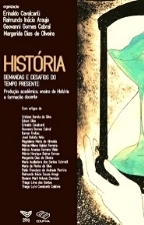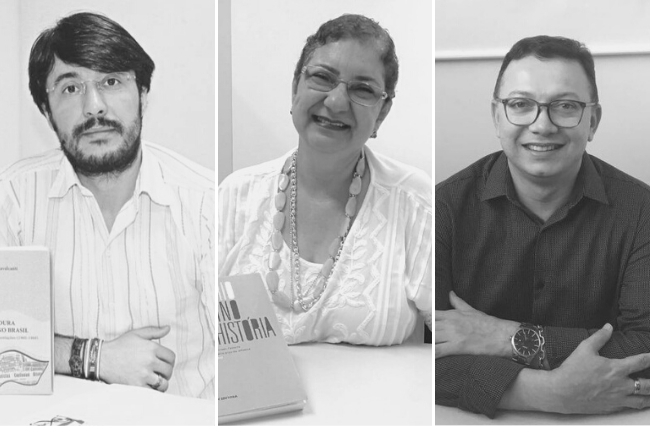Posts com a Tag ‘Formação docente’
Una mirada genealógica en las Prácticas Educativas Inclusivas al interior de la formación docente. Su efecto en el Instituto de Formación Docente Continua San Luis (1993- 2004) | M. M. Garro
La reseña que presentamos da cuenta de la tesis titulada Una mirada genealógica en las Prácticas Educativas Inclusivas al interior de la formación docente. Su efecto en el Instituto de Formación Docente Continua San Luis (1993-2004). En ella, la autora problematiza desde, la perspectiva histórico-filosófica de Michel Foucault, el dispositivo de Formación Docente no Universitario (FDNU) en la provincia de San Luis y analiza, a lo largo del trabajo, el juego de las relaciones de poder-saber que afectaron a los sujetos que participaron en la creación, expansión y cierre delos profesorados. Leia Mais
História: demandas e desafios do tempo presente – produção acadêmica, ensino de História e formação docente | Erinaldo CAvalcanti, Geovanni G. Cabral, Margarida M. D. Oliveira e Raimundo I. S. Araújo
Erinaldo Cavalganti (esquerda), Maria Margarida Dias de Oliveira e Geovanni Gomes Cabral (direita) | Fotos: Correio Carajás / Portal UFRN e Acervo do autor

O contexto de produção da obra está tensionado pela conjuntura política educacional prescrita pela Reforma do Ensino Médio, que torna a matéria História optativa no currículo escolar, segundo a Lei nº 13.415, de fevereiro de 2017. Assim, na apresentação, os/a organizadores/a (também autores/a) registram a importância e a funcionalidade da História em tempos de cólera. Nos textos não encontramos resoluções acabadas, mas reflexões para um repensar de práticas que possam ser transgressoras ao universo acadêmico e às “velhas” formas de narrar a História. Fazer circular outras narrativas e outras experiências de pesquisa, segundo as proposições abordadas na obra, pode/deve contribuir para a formação de professores/as no chão da sala de aula. Leia Mais
A formação docente do PIBID Letras. Alguns recortes de experiências | Alexandra Santos Pinheiro e Rita Maria Decarli Bottega
O livro “A formação docente do PIBID Letras no Brasil: reflexões e (con)vivências”, organizado pelas autoras Alexandra Santos Pinheiro e Rita Maria Decarli Bottega, e publicado pela editora Pontes em 2014, reúne artigos que relatam experiências vivenciadas em subprojetos do PIBID Letras de 8 universidades brasileiras, localizadas em cinco estados das regiões Centro-Oeste, Sudeste e Sul. A inquestionável validade do PIBID para a formação do licenciando dos cursos de Letras é o tema gerador do livro e uma posição partilhada pelos 11 subprojetos, cujo relato das atividades e/ou reflexão de conceitos e metodologia de trabalho compõe(m) a obra. Apesar dessa posição partilhada, os 10 capítulos que integram a obra distinguem-se pela natureza das atividades realizadas em cada subprojeto e/ou por buscarem embasamento teórico em proposições teóricas distintas, ainda que o alvo seja a formação do professor de língua portuguesa.
O capítulo 1, “Formação inicial dos docentes de letras na UFT – Experiências a partir da interdisciplinaridade”, discute as dificuldades enfrentadas com o trabalho interdisciplinar no âmbito do Projeto PIBID-PIBID, envolvendo os cursos de licenciatura em Letras, História, Biologia e Geografia da UFT. Dentre as considerações que o capítulo apresenta para o professor de língua portuguesa, ressaltam-se: a necessidade de repensar conteúdos tradicionais, que valorizam apenas conhecimentos linguísticos e literários em detrimento do desenvolvimento de habilidades e competências, as quais devem ser contempladas; e a necessidade de valorizar “discussões sociais” na proposição de conteúdos conceituais e metodologias de ensino. Leia Mais
Novi Cives. Cittadini dall’infanzia in poi – BORGHI; GARCÍA PÉREZ (C-HHT)
BORGHI, Beatrice; GARCÍA PÉREZ, Francisco F.; MORENO FERNÁNDEZ, Olga. Novi Cives. Cittadini dall’infanzia in poi. Bologna: Pàtron Editore, 2015. Resenha de: BELLATTI, Ilaria. Clío – History and History Teaching, Zaragoza, n.41, 2015.
El libro que aquí se presenta es la obra colectiva de especialistas de distintas áreas de las Ciencias Sociales que debaten sobre la importancia de la Educación para la Ciudadanía activa en la escuela obligatoria y en la formación docente, potenciando distintos aspectos de la enseñanza de la Historia y del Patrimonio cultural, y de la Geografía.
En línea con la trayectoria de difusión científica perseguida por la editorial Pàtron, los editores, se cimentan con una publicación orientada a la comprensión de los problemas sociales actuales, poniendo de manifiesto la necesidad de remodelar la relación entre los individuos y la comunidad a la luz de los nuevos retos de la cohesión social. Leia Mais
Wise Women – Reflections of Teachers of Midlife – FREEMAN; SCHMIDT (CSS)
FREEMAN, Phyllis R.; SCHMIDT, Jan Zlotnik (eds). Wise Women – Reflections of Teachers of Midlife. New York: Routledge, 2000. 274p. Resenha de: SENGER, Elizbeth. Canadian Social Studies, v.36, n.2, 2002.
This book is a collection of reflective essays by long term post-secondary instructors, all female, who have now reached midlife. They offer an insightful variety of perspectives some positive, some rather bitter on the challenges and rewards of teaching careers. For the most part, these educators speak in clear language, full of emotion and heartfelt sentiment, about how the educational process has changed them both professionally and personally. One theme which remains constant throughout is that these women freely chose the education profession and clearly understand the importance of this lifelong work.
Wise Women will appeal to anyone, male or female, who has an interest in the educational experience from the instructor’s perspective and should be in any educator’s professional development library. Although some of the reflections are personal, they all evaluate the personal and professional lives of the writers’, sharing what they have learned to do and not do; sharing the greatest rewards and greatest heartbreaks of their careers, and in some cases, of their personal lives. After reading this book the reader will take away a very clear message about education: that teaching and learning, for all of the parties involved, is an ongoing process in which understandings of strategies, techniques, students and selves is continuously evolving and that it is not a process confined to classrooms or hallowed halls. The impact of educational experiences overflows into all aspects of the lives of those involved.
An interesting element of Wise Women is that very few of the contributors focused on the curriculum they teach, but rather discussed at length the process, the gaining of patience, the deepening understanding of themselves and their students. This truly is a book about living, learning and growing as human beings which the profession of teaching and learning encompasses in a most meaningful way.
The editors asked the writers to reflect upon their teaching careers. This is a valuable, perhaps even necessary process for educators to go through. Each year I teach, I find myself continually evaluating the students in my class (each group may be totally different, as some of the writers pointed out) and how I need to adapt my classroom environment and techniques to help them learn. Given the plethora of new ideas and techniques with which educators are bombarded, it is essential to continually examine what we do, how and why we do it, and to be open to the possibilities of adapting and/or adopting new methods, techniques and strategies, as well as retaining the good processes we have already developed. Personal reflection can certainly be a rewarding, and at times, painful experience and it speaks to the courage of these women that they rose to the challenge set before them. It is clear from their reminiscences that these educators went through many phases of growth in their long and distinguished careers. There is some bitterness and resentment in these contributions, as women still, in the twentieth (now twenty first) century, experience the small mindedness of discrimination on campuses across North America. Clearly, as progressive as the field of education may be, we still have a great deal of work to do in opening peoples’ minds to the value of integrating the talents and abilities of fully half the population. This is one of the important actions we, as educators, need to take and reading this book makes that even more clear.
I believe the significance of this book in focusing on midlife teachers is, in part, to provide assistance for those of us who come after these women; to continue learning how to cope with the vast and varied challenges that education presents. The contributors managed to deal effectively with internal and external changes, but often the struggle has taken its toll. In other cases, some of the writers make the point that while the world around them, and their external appearances may have changed, their inside selves have remained dynamic, young, energetic, and enthusiastic things which all teachers need to do their jobs with joy and love, and I believe, to be truly effective. Teaching at any level is not for the faint of heart!
Teaching and learning is as much about learning how to cope with constant change as it is presenting an established curriculum. While very few of these women focused on, or even mentioned, what curriculum they teach, they all had a great deal to say about the physical and psychological environments in which they work. Human interactions; increasing understanding of self and others; adapting teaching techniques to changing students and changing times; learning to balance personal and professional needs; these are the things which this book deals with so effectively, and it is an essential read for anyone who is, has been, or desires to become that much maligned, but very essential professional a teacher.
Elizabeth Senger – Henry Wise Wood High School. Calgary Alberta.
[IF]

